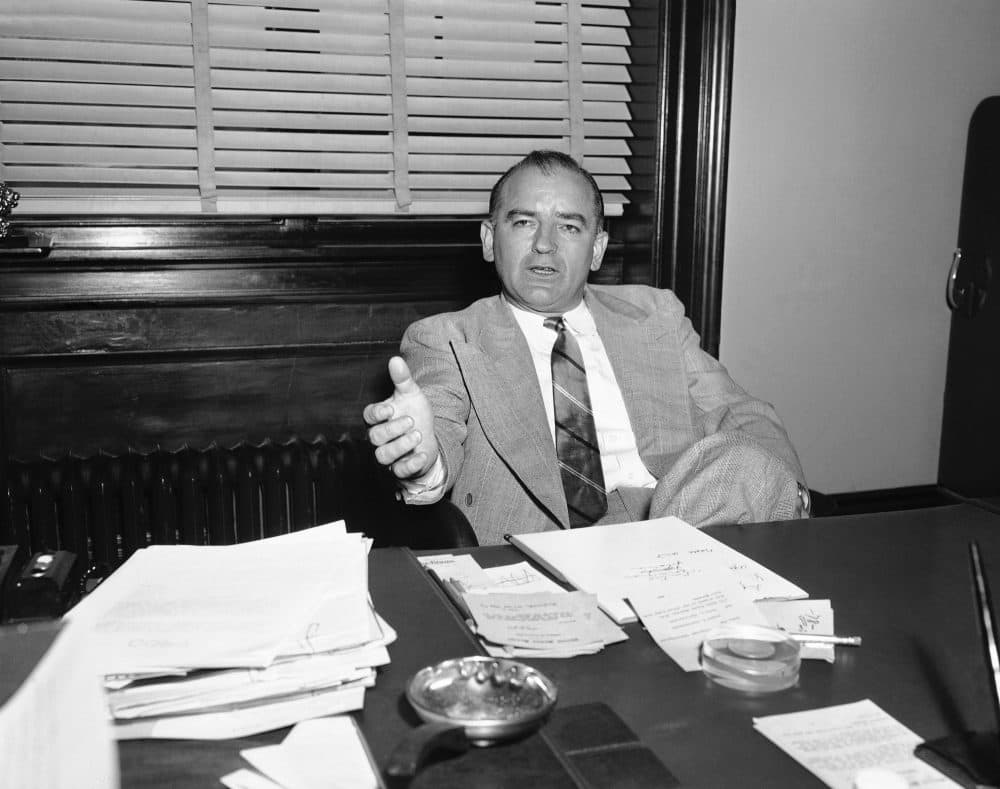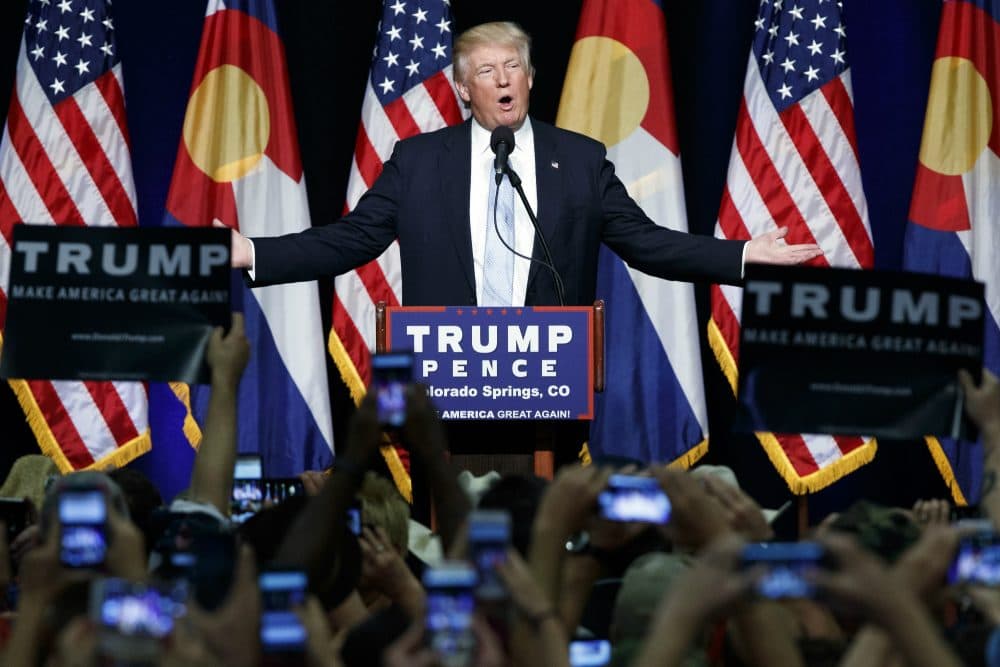Advertisement
Echoes Of McCarthy: Will Trump Pay A Political Price For His Apparent Lack Of 'Decency'?

Donald Trump’s recent contretemps with the Gold Star family of a Muslim-American war hero brings to mind another famously misguided character assassination that politically misfired over half a century ago.
In 1954, Wisconsin Sen. Joseph R. McCarthy was at the height of power as the country’s leading Red-baiting politician. Four years earlier he had grabbed the national spotlight by charging the State Department harbored 205 card-carrying members of the Communist Party. “The reason why we find ourselves in a position of [global] impotency is not because our only powerful potential enemy [the Soviet Union] has sent men to invade our shores, but rather because of the traitorous actions of those [diplomats] who have been treated so well by this Nation,” he claimed. Even though McCarthy subsequently kept changing the figure, indicating he had no clue if his allegation was true, public opinion polls showed a solid majority of Americans believed him.
What followed was a political reign of terror that saw the lives and careers of hundreds of innocent people ruined by the Republican’s reckless behavior. But these victims of what came to be known as “McCarthyism” never concerned McCarthy too much. They were simply a means to an end in making him one of the most powerful and feared figures in America. As the senator once boasted to the press, “If you want to be against McCarthy, boys, you’ve got to be a Communist or a c---sucker.”
While separated by 60 odd years, Trump’s denigrating remarks about the family of slain U.S. Army captain Humayun Kahn are eerily reminiscent of McCarthy’s political self-immolation during the Army-McCarthy hearings.
Such was McCarthy’s influence that even newly elected President Dwight D. Eisenhower was reluctant to take him on, even though he privately loathed the man. “This particular individual wants, above all else, publicity,” Eisenhower said of his fellow Republican. “Nothing would probably please him more than to get the publicity that would be generated by public repudiation by the president…It is a sorry mess; at times one feels almost like hanging his head in shame when he reads some of the unreasoned, vicious outbursts of demagoguery that appear in our public prints.”
Yet there was a limit to Eisenhower’s restraint. That came in the spring of 1954, when McCarthy set his incendiary sites on the United States Army as an alleged haven for subversive Red traitors and spies. With the enthusiastic assistance of his chief legal counsel Roy Cohn, who would later count a young up and coming Manhattan real estate developer named Donald Trump as a client, McCarthy was out for blood. He launched the Army-McCarthy hearings under the aegis of the Senate’s Permanent Subcommittee on Investigations, which he chaired. But McCarthy had disastrously miscalculated. “The Army was not like the Voice of America, the International Information Agency, and other early targets of McCarthy, which lacked the resolve and clout to resist,” writes Larry Tye in the recently published “Bobby Kennedy: The Making of a Liberal Icon.” “McCarthy was now slinging his mud at the mighty bastion of the U.S. military. The generals were outraged and their commander in chief was, too.”

Eisenhower, a West Point graduate and Supreme Allied Commander of the D-Day invasion during World War II, had seen enough. He worked furiously behind the scenes to discredit McCarthy and his charges. In the end, though, McCarthy provided the rope to his own hanging.
In the course of the nationally televised hearings, where viewers at home got their first up close and personal look at the Wisconsinite’s brutal political style, McCarthy was at his demagogic worst. He focused his attention on one Fred Fisher, an attorney who worked in the same Boston law firm of Army lead defense counsel Joseph Welch. “I think,” McCarthy thundered, “we should tell [Welch] that he has in his law firm a young man named Fisher, whom he recommended, incidentally, to work on this committee, who has been for a number of years a member of an organization which was named, oh, years and years ago, as the legal bulwark of the Communist Party.”
Welch, a highly respected Harvard Law School graduate and senior partner at Hale & Dorr, pounced on the opening McCarthy had inadvertently provided. “Until this moment, senator, I think I never really gauged your cruelty or your recklessness,” he dramatically replied. “Fred Fisher is a young man who…came into my firm and is starting what looks to be a brilliant career with us… I fear he shall always bear a scar needlessly inflicted by you.”
Advertisement
When McCarthy refused to let up, Welch delivered the rhetorical equivalent of a knockout punch. “Let us not assassinate this lad further, senator,” he said. “You have done enough. Have you no sense of decency, sir, at long last? Have you left no sense of decency?”
McCarthy never recovered. Public opinion soon turned against him and he was formally censured by a bipartisan vote in the Senate. “Have you heard the latest?” a delighted Eisenhower asked his Cabinet. “McCarthyism is McCarthywasim.”
McCarthy died a broken man at age 48 in 1957.
While separated by 60 odd years, Trump’s denigrating remarks about the family of slain U.S. Army captain Humayun Kahn are eerily reminiscent of McCarthy’s political self-immolation during the Army-McCarthy hearings. In both cases, McCarthy and Trump overreached and revealed themselves to be petty, mean-spirited bullies.
The big question is whether Trump will pay the political price that McCarthy did. That answer will go a long way in determining the outcome of the presidential election this November.
